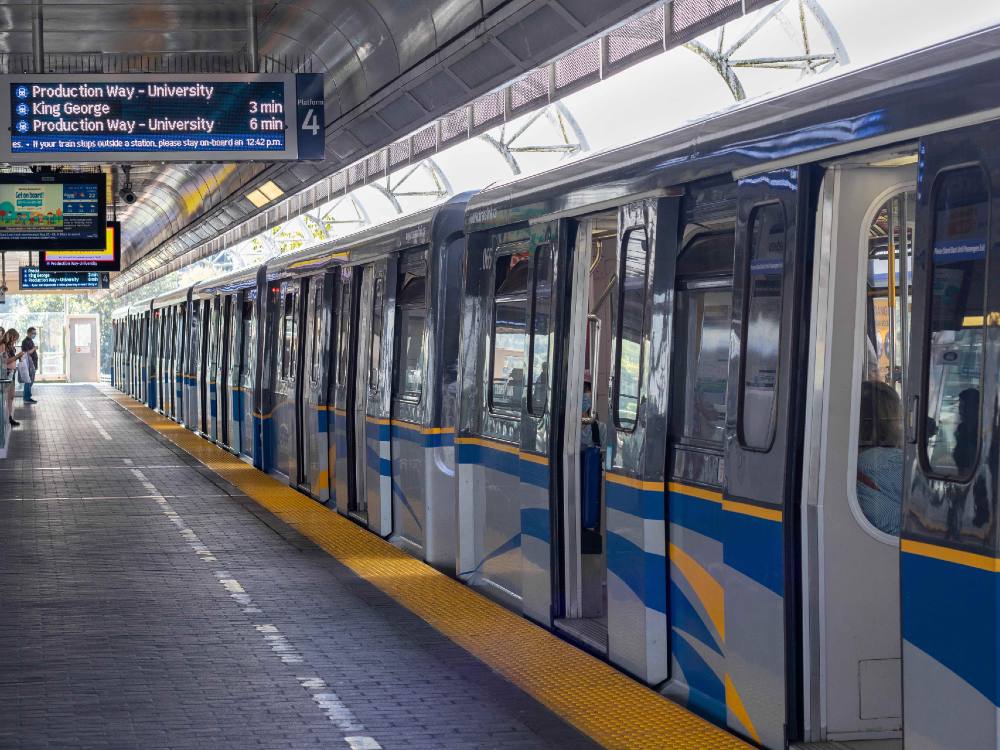If you watch the news, you may be thinking twice about taking public transportation.
In Burnaby, a man was arrested last month after allegedly attacking commuters on the SkyTrain. New Westminster police were called to a train station after a stabbing. And in Surrey, a 17-year-old was stabbed and killed on a bus.
News reports raised fears about safety on public transportation. Premier David Eby promised action. Police increased patrols.
In reality, violent crime rates on public transportation in Metro Vancouver have declined in recent years.
But CUPE 7000 president Tony Rebelo said SkyTrain workers are increasingly on the frontlines dealing with the effects of Metro Vancouver’s social problems: homelessness, a poison drug crisis and inadequate mental health care.
The union represents about 1,000 SkyTrain employees who are increasingly responding to people in crisis, he said.
“We’re continuously dealing with those things all the time,” said Rebelo. “But we’re not continuously dealing with major violent crime.”
Transit Police Cst. Travis Blair says it is understandable people are worried about violent crime after such a jarring series of high-profile attacks.
But he says members of the public may be conflating the two problems.
“As always, we just want the public to feel reassured that the transit system is indeed safe,” said Blair. “We understand that these attacks and these violent offences that have happened have caused a little bit of knee-jerk reaction.”
The numbers
Rebelo has worked on SkyTrain for 21 years. Every day, his members help hundreds of thousands of people get where they’re going.
“We’re the boots on the ground, the eyes on the street. We’re trained to observe and report. We’re trained to deal with passenger issues… their ultimate goal is to keep the passenger safe while they’re on our system,” Rebelo said.
After the attacks, Rebelo’s union released a statement calling for more funding to hire SkyTrain attendants. He said that public safety on transportation had reached “crisis” levels.
The Daily Hive recently reported that in 2022 crimes against people reported to Metro Vancouver’s Transit Police were up 15 per cent, including a 24 per cent jump in assaults. Reported sexual offences were up, too.
But while it’s true that more crimes were reported to police in 2022, ridership also increased 48 per cent as more people began taking public transportation following two years of a pandemic-induced slowdown. The likelihood of being a victim of crime actually decreased in 2022.
“To me, it’s a bit of a numbers game where the more people you have on the system, the more prone you are to different types of emergencies, one of them being acts of violence,” Rebelo said.
When TransLink analyzed the number of reported crimes relative to the number of actual passengers, it found there were was 0.48 per 100,000 passengers in 2022. That’s only slightly higher than it was in 2018, and down sharply from 2021 and 2020, when it was reported at 0.61 and 0.67, respectively.
Assaults against transit staff are down, too. In 2020, the rate of assaults against transit operators for every million passengers was 0.45. In 2022, it was 0.32, roughly the same as it was in 2018.
There’s also no evidence of any increase in attacks against transit workers in British Columbia. From 2018-22, WorkSafeBC received 470 claims from transit staff related to violence on the job. They received 88 claims in 2022, more than the previous two years but less than the number of claims they received in 2019.
But Rebelo and Blair say TransLink police and workers are facing other issues.
In recent years, Rebelo said, his members are increasingly helping people with nowhere to sleep. They’re responding to acute mental health episodes. “We deal with that on the system on a daily basis. People are trying to stay warm and will use public transit to stay warm, because they’re homeless,” Rebelo said.
Staff take a week-long situational training course, Rebelo said, that is designed to train them for such scenarios, but it’s not always enough. Transit workers are among the employees most likely to submit mental health injury claims to the province’s worker compensation system, something Rebelo said is likely due to increased awareness and the tough realities of the job.
“We don’t like to say it’s part of the job, but unfortunately, we do deal with these things,” he said.
Blair, the police spokesman, has worked on transit since 2017. In that time, he says the number of medical calls has grown.
“Definitely medical calls have increased substantially. Just being a frontline first responder, we are seeing a lot of medical calls,” Blair said.
Neil Boyd, a criminologist and former professor at Simon Fraser University, says it’s not unusual for public perceptions of crime to differ from the rates of crime.
“I think what happens in these circumstances is you get one or two horrific cases. And there’s a leap from these one or two horrific cases to making an assumption that things have been spinning out of control and we’ve reached a new plateau,” Boyd said.
Boyd says social media has amplified that effect. So has recent concern about public safety in Canada, something Blair said he welcomes.
“It’s swinging into the direction of wanting answers, wanting to place responsibility onto the provincial government, who is now looking to the federal government,” Blair said.
But Boyd says some of that concern conflates actual crime with other social problems like poverty.
“What people see and what they experience may not rise to that level [of criminality], but they’re uncomfortable with that situation,” Boyd said.
Blair says he doesn’t want to invalidate public concerns about safety on the bus. “Numbers are numbers, but people have to ride the transit system every day,” he said.
But Rebelo said violent crime, at least for his members, is not as big a problem as the daily crises they confront.
“Personally, I think it’s the social problems.” ![]()
Read more: Rights + Justice, Transportation, Labour + Industry
















Tyee Commenting Guidelines
Comments that violate guidelines risk being deleted, and violations may result in a temporary or permanent user ban. Maintain the spirit of good conversation to stay in the discussion and be patient with moderators. Comments are reviewed regularly but not in real time.
Do:
Do not: